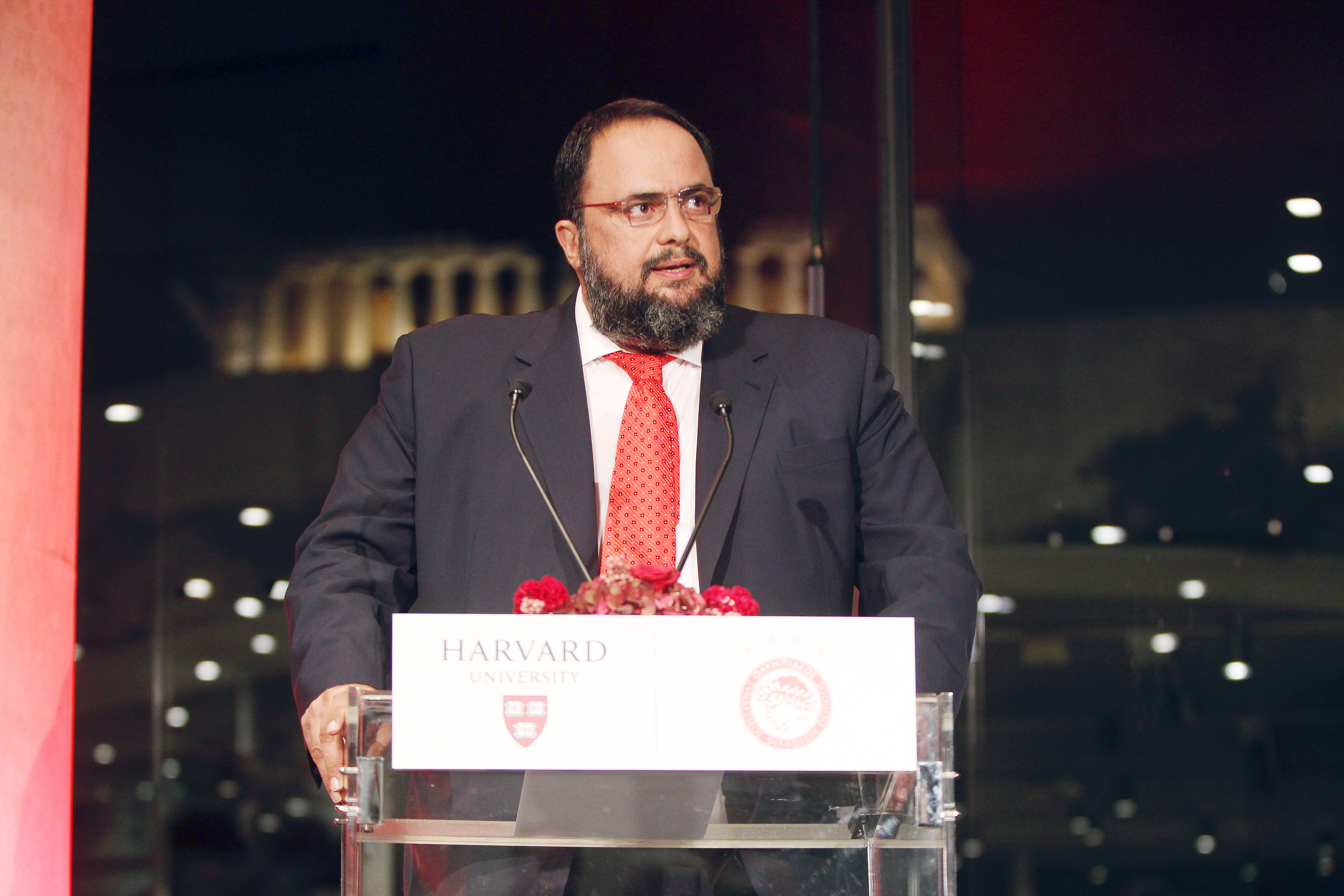Olympiacos has been and remains our country’s best ambassador abroad. Starting with football, that Olympiacos has been permanently and deservedly representing at the mainstage of Europe, and ending with Greek culture as a whole, our Club is always present when it comes to promoting Greece!
Harvard University’s World Conference entitled “Reinforcing, Crossing, and Transcending Borders: Soccer in a Globalized World” and taking place in our country these days, is just one aspect of Olympiacos desire to lead such efforts, let alone take part in them. For the next 2-3 days, our country will be gathering attention by international academia, since professors from around the world will attend in order to discuss how football and sports in general may be of service to humanity!
On Monday evening, September 4th,, 2017, the Acropolis Museum became the meeting place for professors invited in Greece by Harvard University for this great conference. Olympiacos, naturally, played host thereof. From 19:30, when the Museum’s tour for attendees started until late at night, after the end of the official dinner, Olympiacos showed once again what Greek hospitality is about! The Acropolis Museum accommodated many Greek football and Greek sports stakeholders, politicians involved with football and others. Of course, the event was also attended by Olympiacos FC top administration, namely its Board of Directors and other executives from with the club’s Football Division.
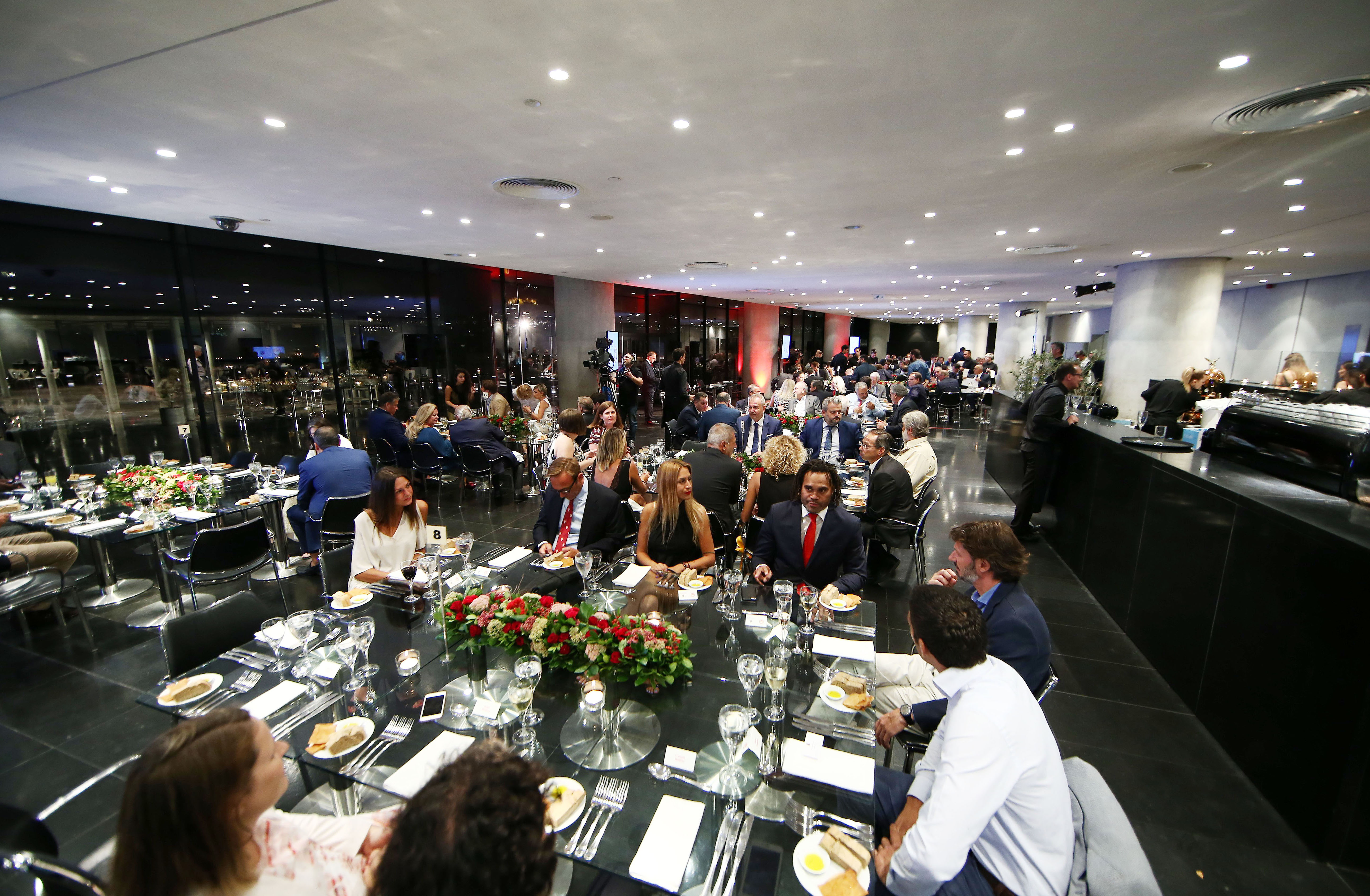
After the Museum tour came the speeches that declared the conference open! Mr Evangelos Marinakis, Olympiacos FC President, Sven Beckert, Harvard University’s Professor of History and Stephen Ortega, Director of the Simmons College Graduate Program in History/Archives Management, were the first ones to address the attendants.
Then followed the reading of The Athens Principles on the Right to Participate in Sport, whereas, after that, the floor was given to Hurst Hannum, Professor of International Law, Tufts University, USA (ΗΠΑ), and Amanda Lucia Munoz de Toro Alimonda, Coordinator of Advocates Abroad, providing free legal counsel to refugees in Europe. Our keynote speaker and the one to formally “kick off” with the conference’s works was George Mitchell, Former United States Senator from Maine, Senate Majority Leader, International Peace Envoy.
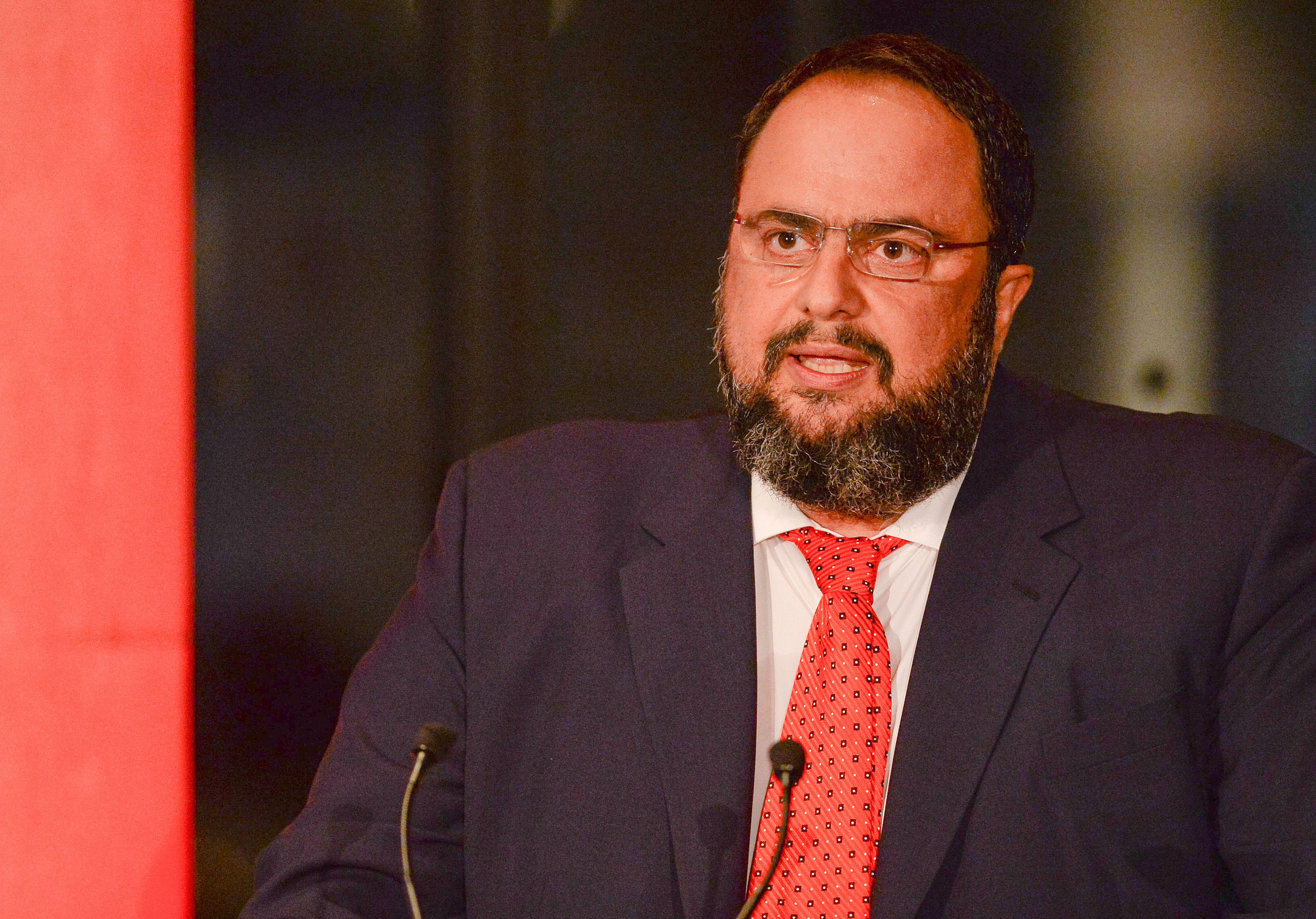
Olympiacos FC President, Mr Evangelos Marinakis, in his opening speech, welcomed all attendants with the following words. “Senator Mitchell, honoured guests, Ladies and Gentlemen, it is my pleasure to welcome you all to this conference. It will be, I am sure, a very special event, focusing on themes that are very dear to many of us.
Together, we will seek to mobilize the great game of football, and sport in general, in the service of humanity. We are indeed fortunate to have gathered here many knowledgeable and talented individuals from a range of different professional backgrounds who I know will make a major contribution to our understanding of some of these critical and complex issues.
I would like to give special thanks to Harvard University, to the Weatherhead Initiative on Global History and Simmons College of Boston for their incredible work in putting together the conference and sharpening our agenda”, were the first words of Olympiacos FC President, before he continues:
“Now, I believe that any society should be judged by how it treats its most vulnerable and defenceless people. That is why this agenda is so close to my heart. Major football clubs currently rank amongst the most powerful and influential foundations of our world. It is vital that they now accept their social responsibility towards their communities, and the world, by means of promoting specific actions and initiatives that can change the lives of everyday people.
Here in Greece, the cradle of democracy and the Olympic Games, we can revisit this ancient tradition whereby sports became an opportunity for the Greek city-states and their citizens to connect, bring together different cultures, respect the rules of fair play and suspend legal disputes and wars for the duration of the Olympic truce, to ensure all athletes and spectators, irrespective of their class or social standing, could travel safely to the Games and peacefully return to their respective countries. Democracy is based on social justice, when all laws and regulations apply for everyone. Unfortunately in modern Greece social democracy does not apply to everyone, but this hopefully change soon enough.
Over the next couple of days, we will have the opportunity to examine closely how football in a globalized world can improve people’s lives. We will see how it can cross borders, overcome ancient enmity and bring millions of people around the world together. In particular, we will see just how much the opportunity to play or watch sport can mean to refugees and displaced people.
We will see how, even in the midst of conflict and deprivation, sport can play a critical role. It can inspire; it can unite us; and it can bring out the best of humanity”.
Mr Marinakis also commented on our Club’s effort in the area of Social Responsibility. “In Olympiacos we have accumulated our own share of experience in our effort to help our fellow-people. Since 2013, Olympiacos remains the biggest donor amongst numerous donors and supporters of UNICEF-lead 100% campaign, saving thus hundreds of children around the globe by means of vaccinating them and by means of training thousands of healthcare providers. In another front, not too long ago, I have decided that the Club should substantially contribute and benefit those thousands of refugees who have turned our home city of Piraeus into their own home. The club has been daily delivering portions of food, clothing and toys to displaced people. Our players, staff and others took part in that really unique and remarkable effort.
But do you know what the most amazing part of that was for me?
It was not just the material support, critical though that was. No, it was, above all, the positive impact that the action had on the attitude of thousands of people towards refugees. Seeing an institution like the beloved local football club embrace vulnerable people, changed attitudes for the better in a very dramatic way; and it happened very quickly. We saw many people move from a position of hostility, to a much more welcoming and humane perspective. It was remarkable to see at the time and very moving. All refugees were treated with dignity and respect!
As president of Olympiacos I have the honour and responsibility to be the first one to sign “The Athens Principles on the right to participate in sports”. I hope that all presidents of European Football clubs will sign and support this “Athens Principles”, which is coming out from this conference”, he stressed.
He concluded by sharing his wishes for a great conference that will elaborate solutions to the benefit of our fellow people! “So, ladies and gentlemen, I look forward to working with you over the coming days to project our common values onto a much broader canvas. I know that we will have a great conference and I very much look forward to taking our mission forward together.
I also look forward to sponsoring the 3rd conference which will take place at Harvard University next June to continue this important mission! Thank you very much”, he particularly said and all participants and attendants broke out in applause.
Then the floor was given to Mr Steven Ortega, who, amongst other things, said: “As the main organizer of this conference I really have lots of people to thank! Mr Marinakis, for his dedication in the effort to build a link between a football club, an academic institution and an NGO. He has our undisputed gratitude! His donation and putting this conference together, has allowed us to establish principles that are unique and unprecedented. Thanks to his assistance, we can spend the next couple of days reflecting and discussing on crucial and fundamental issues of world football, with the aim of providing solution! We thank you and we hope to work with you again in the future!”
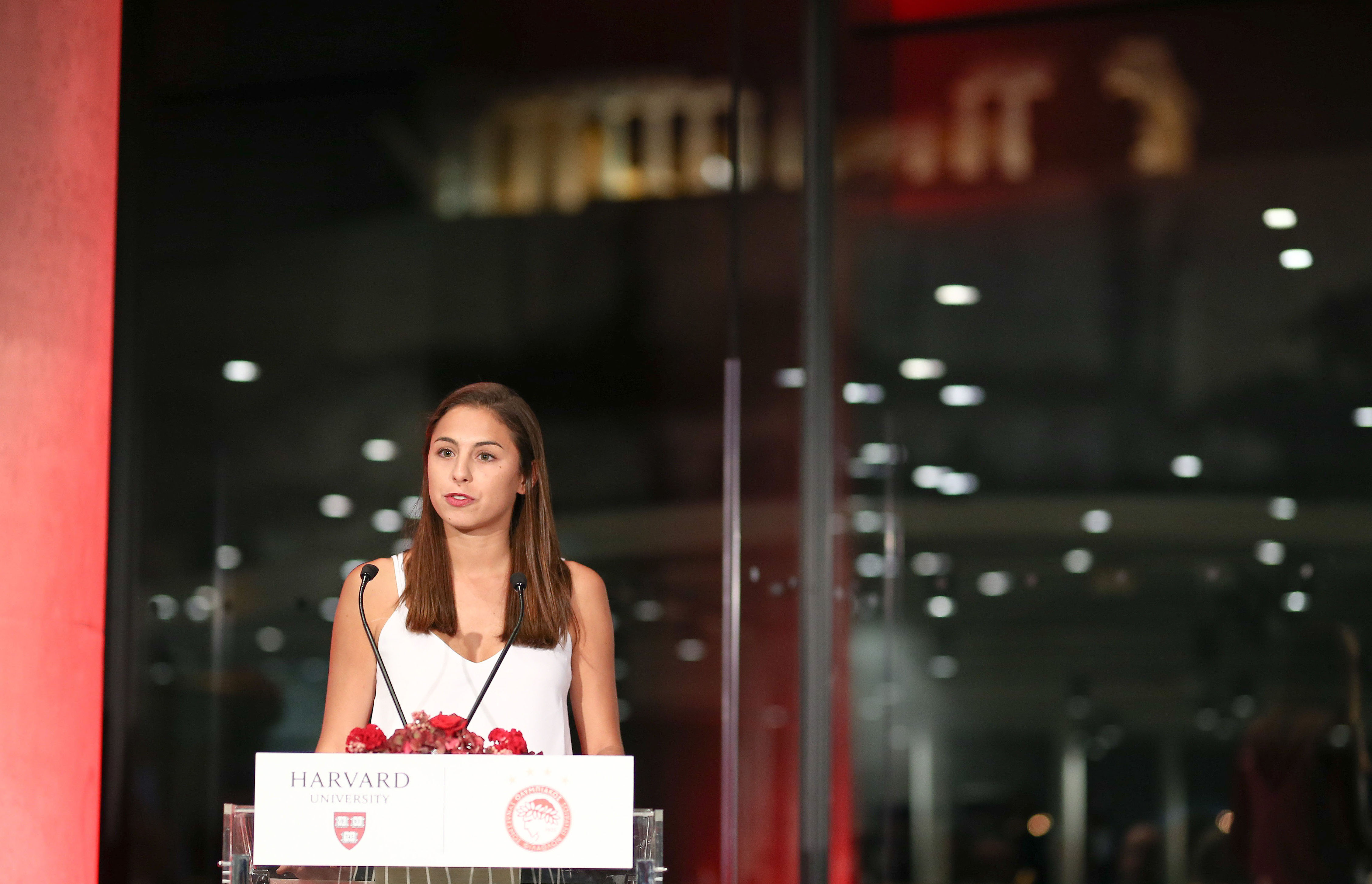
Next followed the reading of The Athens Principles on the Right to Participate in Sport, By Amanda Lucia Munoz de Toro Alimonda:
Reinforcing, Crossing, and Transcending Borders: Soccer in a Globalized World
Weatherhead Initiative on Global History, Harvard University
Supported by Simmons College, Boston, MA Hosted by Olympiacos F.C. in Athens, Greece
The Athens Principles on the Right to Participate in Sport,
Preamble
Sport provides life skills and values that have a long lasting impact on people’s lives. It builds confidence, inspires youth, and helps overcome prejudice. It has the power of transcending borders and bringing people together, regardless of their race, gender, religion, culture or nationality.
The sport industry has grown significantly over the last few decades. Sport teams have worldwide followings and passionate groups of supporters who come from different social backgrounds. This broad base of support contributes to clubs’ widespread presence in social media and to the increased attention that sport organizations receive from the press.
This expanded visibility enables clubs and their players to influence public discussions and to embrace the added social responsibility that comes with such influence. This responsibility extends to ensuring that as many people as possible are able to play the games they love, without encountering discrimination or prejudice.
The responsibility of clubs and their players in promoting universal participation is even more crucial at a time when the number of displaced people in the world escaping conflict or persecution has reached its highest point in history. According to the UN High Commissioner for Refugees, 20 people are displaced from their homes every minute, a high percentage of whom are unaccompanied children and disabled men and women.
In the spirit of achieving universal participation, the 2015 UNESCO Sport Charter1 reaffirms that the right to participate in sport is a fundamental right for all. However, many people in the world are still deprived of this right because of lack of opportunity, lack of access or prejudice. It is therefore the responsibility of clubs and sport associations to help extend the benefits of participation in sport to individuals in all communities, especially those who are marginalized or vulnerable.
Guided by our social responsibilities and reflecting the rights and duties established in the UNESCO
Sport Charter, we agree to promote, support and implement the following 12 Principles:
1. This Declaration is a common standard of achievement for all clubs, teams, players and sports associations of all sports, to the end that every individual and company should strive, through education and example, to promote respect for these rights and to progressively secure their effective recognition and observance.
2. Every human being has a fundamental right to participate in sport without discrimination on the basis of ethnicity, gender, sexual orientation, language, religion, political or other opinion, or national or social origin. Furthermore, no distinction should be made on the basis of the political or international status of the country or territory to which a person belongs. Clubs and sport associations should actively campaign against and refuse to engage in any such discrimination at both youth and professional levels.
3. Participation in sport should be based on the principles of healthy and honest competition and respect for all competitors.
4. Initiatives that encourage the participation of displaced people, whatever their civil status, in sporting activities should be supported.
5. Sport for young people should be first and foremost about participation, physical activity and having fun.
6. Girls should have as much access to sport and sport teams as boys, particularly in school and in youth games and leagues.
7. Everyone should have equal access without discrimination to sport training, resources and services, as well as the opportunity to participate in all supervision and decision-making at all levels of sport.
8. Clubs and sport associations agree to encourage greater participation in sport in conflict ridden or economically depressed areas and, when possible, to contribute financial resources, including providing used but appropriate equipment for the use of those people who lack adequate resources to participate in sport.
9. Adequate and safe places, facilities, equipment and dress-options should be provided to meet the needs of all participants in sport, bearing in mind the different needs associated with people of different cultures, genders, ages and abilities.
10. Sport facilities should be made more accessible to a greater percentage of the global population.
11. An International Day of the Right to Play should be declared to affirm the right to participate in sport as a universal and fundamental right and to promote the principles set out in this Declaration.
12. Initiatives should be developed to create partnerships with researchers and NGOs whose work will be helpful to implementing these principles.
Evangelos M. Marinakis
President, Olympiacos F.C”
It is worth mentioning that said Principles have been signed first by Olympiacos FC President, Mr Evangelos Marinakis, and then the Harvard University took on to forward the text to all European clubs, and beyond, for them to sign it as well!
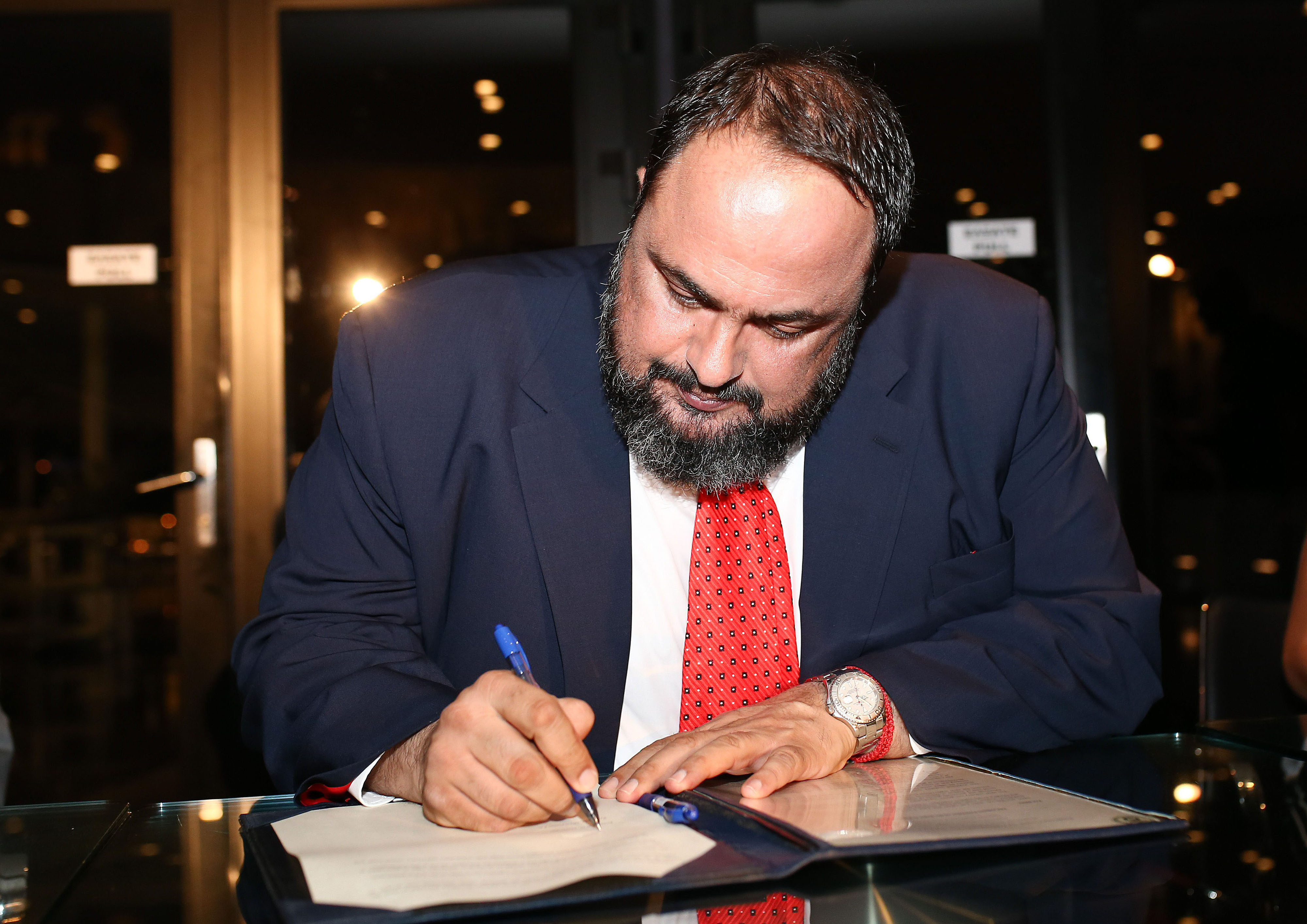
Other speakers followed with Acropolis setting the backdrop of their addresses. Next was Hurst Hannum, who stressed: “Sports is a main vehicle to put all kinds of discrimination aside. It is a basic right of all individuals in the world, who must have the opportunity to participate in the way they want to. Respect, solidarity and sporting values have to be our guide”.
For his part, Mr Beckert underlined, amongst others: “I would like to address my heartfelt greetings to the second instalment of this conference we organize about football. In these times we are living, we have to write and keep on writing history for the sake of all people in this world! And we have to do so by creating ties amongst people, countries or even continents! This is where out interest is focused upon. This conference starting tonight perfectly exemplifies the work we are doing! Football, with its long history, is a main driver of unity between all peoples! The rules of the game, the players themselves, fans and other things may be understood everywhere across the globe only via a universal perspective!
I would like once again to thank Olympiacos and Mr Marinakis. We thank you for believing in this effort of ours; in the difference that the academia may make in the world of football. [we also want to thank] all Greeks for their extraordinary attitude and the way they welcomed all refugees who reached Greek shores in waves!”
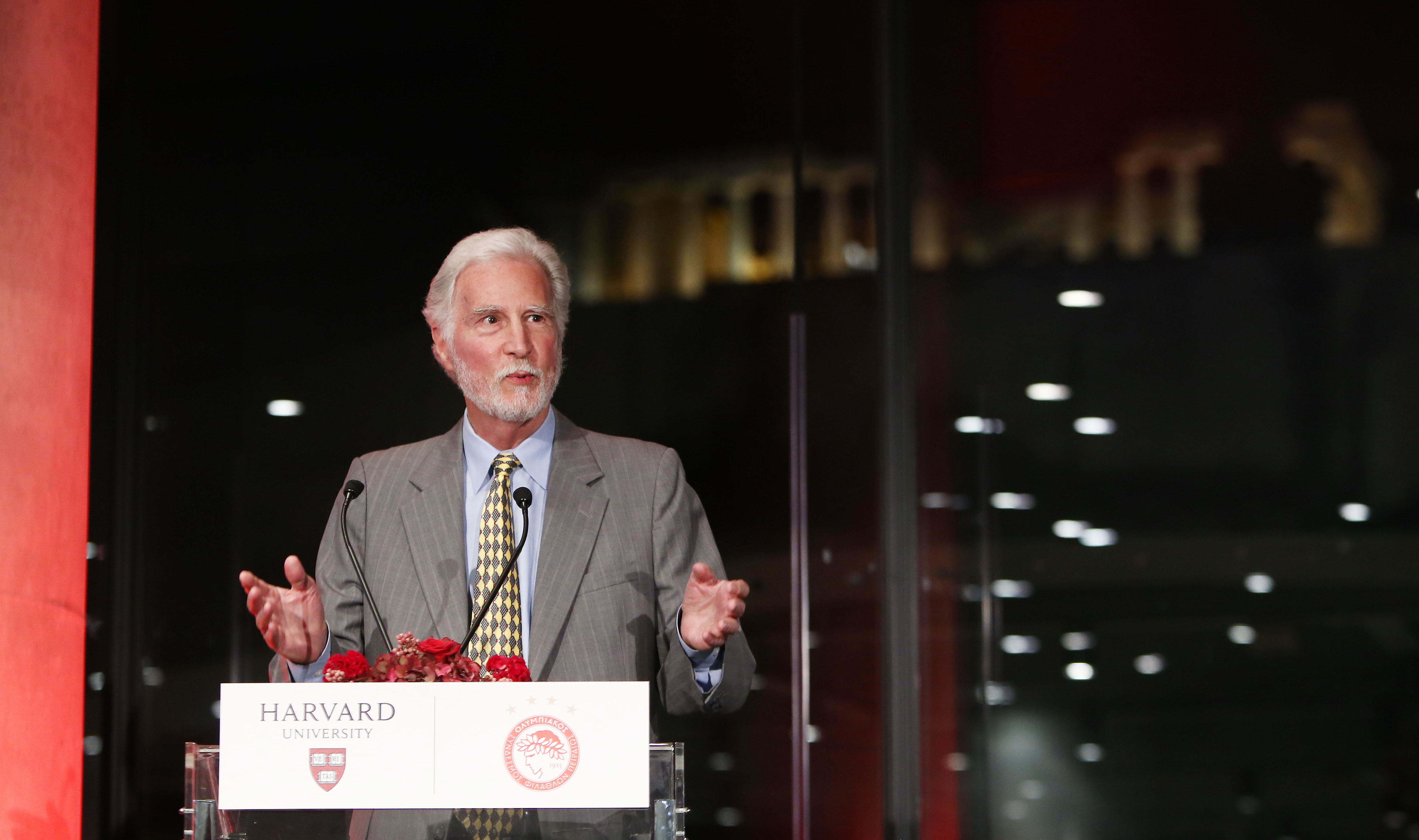
Last, Senator George Mitchell addressed the floor in order to thank Olympiacos and Mr Marinakis for their hospitality and assistance to organize this conference, and added amongst others:
“Thank you for being here today. Mr Marinakis is the main driver of this great event and everything that had led to it! Mr. Beckert, Mr. Ortega, the Simmons College, everybody had supported this effort to the maximum. Of course, I would like to express my warm thanks to all those who contributed enormously to compile and draft The Athens Principles on the Right to Participate in Sport; Mr. Hannum, Mrs Munoz de Toro. I have never seen in my life a set of principles so well written and I would really want to express my gratitude to Mr Marinakis, Amada, Horst and Steven (Mrss Munoz de Toro, Hannum and Ortega), who helped make all this come true”.
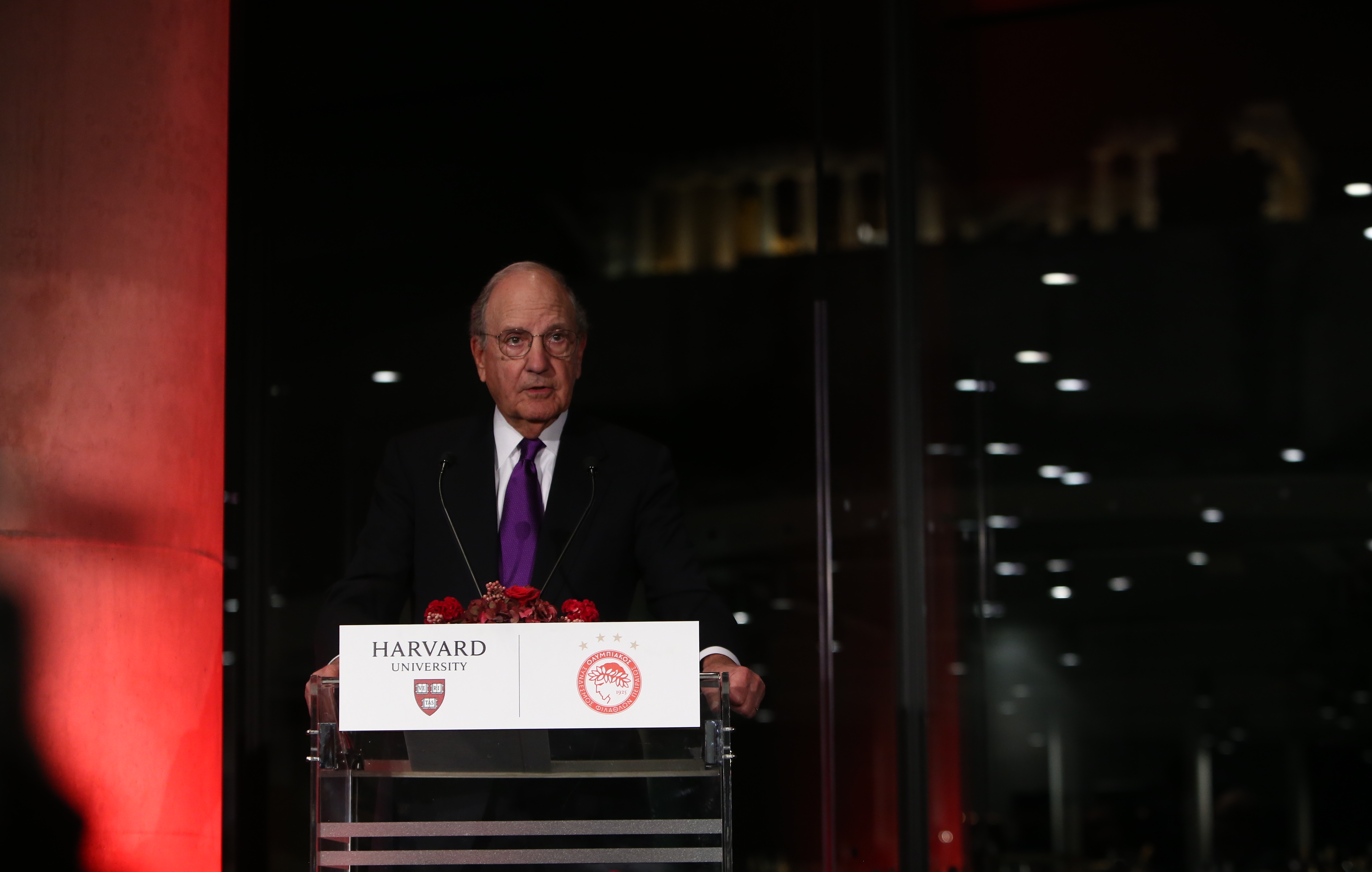
After the end of these addresses, the conference, that is to take place at the Karaiskakis stadium Tuesday and Wednesday, was officially declared open and followed by a dinner with Acropolis as backdrop; the menu included lots of discussions on how football and sports in general may serve humanity better.
